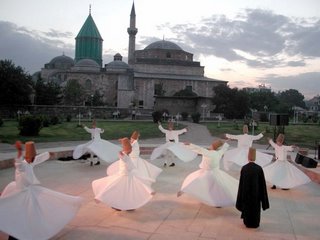 Rumi reader is probably the most questioned part of the above Antinomia description.
Rumi reader is probably the most questioned part of the above Antinomia description.Jalalludin Rumi was a sufi teacher in Turkey in the 1200s, and the originator of the Mevlevi sufis, the whirling dervishes. He had a pretty normal life until he was 34, when he met the mysterious and rebellious wanderer, Shams Tabrizi, who questioned Rumi's faith and threw all his theological books into a fountain. Rumi was so struck with love for Shams that he passed out from a kind of ecstatic epiphany on the spot. Shams immediately became his beloved friend and teacher, the two were scandalously inseparable for years until Shams was killed by Rumi's jealous students. The loss sent Rumi into the deepest despair and he walked around a pole in his garden for a month, and this is the story of how the whirling, the turning, or the sema, came to be.
After he'd worn a circle a few feet into the ground he started writing poetry inspired by the absence of his friend. He wrote so much it filled a couple dozen books. He is the best selling poet in the United States.
It's easy to relate to Rumi's circular method of grieving and admire his way of turning sadness into a joyful dance. And in his poems he comes across as someone you'd very much like to know. He's relentlessly enthusiastic and optimistic, even in the worst kind of longing and heartache. To him the universe is ever playful, and he never loses his sly sense of humor. It seems like he loved life so much he couldn't contain himself. His poems are bursting with fire and wine and love without shame or apology.
pulls you away from.
Decisions made at
night seem strange the next day. Where
are you when you sleep? A trickster
curls on the headboard. Restless in
the valley, you go to the ocean. Then
turning toward the light, you fall in
the fire. Who jiggles this battered
saucepan? The sky puts a yoke on you
to help with turning around a pole.
Teachers get dizzy like students. The
lion that killed you now wonders whether
to drag you off or tear you to pieces
here. There's a shredding that's really
a healing, that makes you more alive!
A lion holds you in his arms. Fingers
rake the fretbridge for music. A
compass revolves around the metal foot
point. Some grow fond of battle armor;
some, satin clothing. Others, like me,
love the word bunches called poetry.

3 comments:
That photo immediately reminded me of Lisbeth Zwerger's art.
Beautiful!
You introduced me to Rumi, thank you :)
Wow--I know you explained the whirling dervishes to me, but it didn't really hit home until I read this. Thank you so much--this is beautiful!
Post a Comment